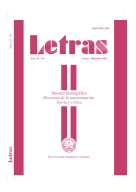Por favor, use este identificador para citar o enlazar este ítem:
https://repositorio.uca.edu.ar/handle/123456789/3811| Título: | Mirada y voz en el cine de Lucrecia Martel : aportes desde la teoría crítica feminista | Autor: | Punte, María José | Palabras clave: | Martel, Lucrecia; CINE; TEORIA CRITICA; FEMINISMO | Fecha de publicación: | 2011 | Editorial: | Universidad Católica Argentina. Facultad de Filosofía y Letras | Cita: | Punte, María José. “Mirada y voz en el cine de Lucrecia Martel : aportes desde la teoría crítica feminista” [en línea]. Letras, 63-64 (2011). Disponible en: https://repositorio.uca.edu.ar/handle/123456789/3811 | Resumen: | Resumen: La teoría crítica feminista se viene ocupando del tema de la construcción de la mirada en el cine, sobre todo en su formato clásico codificado desde la industria norteamericana. Considera que el aparato cinemático funciona como lo que Teresa De Lauretis llama la “tecnología del género”, una forma de reproducción de los estereotipos imperantes sobre los géneros sexuales. Este artículo toma como punto de partida la posición de Laura Mulvey, acerca de una mirada que tiende a cosificar a la mujer y convertirla en fetiche. Explora las posibilidades que ofrece el cine de la joven autora argentina Lucrecia Martel como una forma de “contra-cine”. Es decir, de un cine alternativo a los formatos hegemónicos, en el cual aparece representada la complejidad del deseo femenino, las diversas posiciones que puede adoptar la mirada y la reivindicación de la voz en la configuración de ese deseo. Abstract: Feminist theory is working since the 70’s on some topics related to the cinematic apparatus, like the construction of the gaze and the use of the voice. It refers particularly to classical films produced in the industry’s heart, meant by Hollywood. Teresa De Lauretis speaks about the “technologies of gender”, referring to a form which tends to reproduce established stereotypes about gender representations. This article takes as a starting point Laura Mulvey’s ideas about the construction of the gaze as a prerogative of the male. One of the consequences is the construction of a woman as an object to-be-looked. The aim of this analysis is to explore the possibilities of a “counter-cinema”, which is probably easer to find in the margins of the industry more than in its center. Young director Lucrecia Martel is perhaps one of the most interesting voices emerging from a new generation of argentinian film-makers. Her movies work through the complexity of female desire, the different positions of the gaze inside the screen, and the importance of the voice for shaping desire. |
URI: | https://repositorio.uca.edu.ar/handle/123456789/3811 | ISSN: | 0326-3363 | Disciplina: | LITERATURA | Derechos: | Acceso Abierto |
| Aparece en las colecciones: | LETRAS - 2011 nro. 63-64 |
Ficheros en este ítem:
| Fichero | Descripción | Tamaño | Formato | |
|---|---|---|---|---|
| mirada-voz-cine-lucrecia-martel.pdf | 175,49 kB | Adobe PDF |  Visualizar/Abrir |
Visualizaciones de página(s)
1.083
comprobado en 30-abr-2024
Descarga(s)
741
comprobado en 30-abr-2024
Google ScholarTM
Ver en Google Scholar
Este ítem está sujeto a una Licencia Creative Commons

